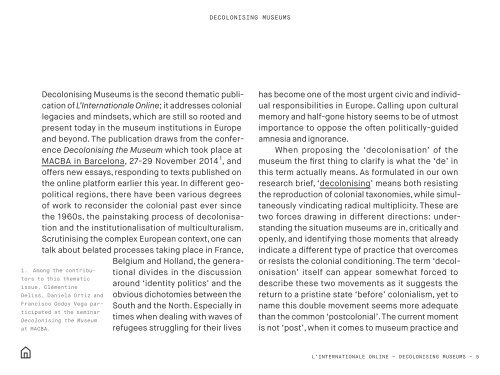DECOLONISING MUSEUMS
decolonisingmuseums_pdf-final
decolonisingmuseums_pdf-final
You also want an ePaper? Increase the reach of your titles
YUMPU automatically turns print PDFs into web optimized ePapers that Google loves.
<strong>DECOLONISING</strong> <strong>MUSEUMS</strong><br />
Decolonising Museums is the second thematic publication<br />
of L’Internationale Online; it addresses colonial<br />
legacies and mindsets, which are still so rooted and<br />
present today in the museum institutions in Europe<br />
and beyond. The publication draws from the conference<br />
Decolonising the Museum which took place at<br />
MACBA in Barcelona, 27-29 November 2014 1, and<br />
offers new essays, responding to texts published on<br />
the online platform earlier this year. In different geopolitical<br />
regions, there have been various degrees<br />
of work to reconsider the colonial past ever since<br />
the 1960s, the painstaking process of decolonisation<br />
and the institutionalisation of multiculturalism.<br />
Scrutinising the complex European context, one can<br />
talk about belated processes taking place in France,<br />
Belgium and Holland, the generational<br />
divides in the discussion<br />
around ‘identity politics’ and the<br />
obvious dichotomies between the<br />
South and the North. Especially in<br />
times when dealing with waves of<br />
refugees struggling for their lives<br />
1. Among the contributors<br />
to this thematic<br />
issue, Clémentine<br />
Deliss, Daniela Ortiz and<br />
Francisco Godoy Vega participated<br />
at the seminar<br />
Decolonising the Museum<br />
at MACBA.<br />
has become one of the most urgent civic and individual<br />
responsibilities in Europe. Calling upon cultural<br />
memory and half-gone history seems to be of utmost<br />
importance to oppose the often politically-guided<br />
amnesia and ignorance.<br />
When proposing the ‘decolonisation’ of the<br />
museum the first thing to clarify is what the ‘de’ in<br />
this term actually means. As formulated in our own<br />
research brief, ‘decolonising’ means both resisting<br />
the reproduction of colonial taxonomies, while simultaneously<br />
vindicating radical multiplicity. These are<br />
two forces drawing in different directions: understanding<br />
the situation museums are in, critically and<br />
openly, and identifying those moments that already<br />
indicate a different type of practice that overcomes<br />
or resists the colonial conditioning. The term ‘decolonisation’<br />
itself can appear somewhat forced to<br />
describe these two movements as it suggests the<br />
return to a pristine state ‘before’ colonialism, yet to<br />
name this double movement seems more adequate<br />
than the common ‘postcolonial’. The current moment<br />
is not ‘post’, when it comes to museum practice and<br />
L’INTERNATIONALE ONLINE – <strong>DECOLONISING</strong> <strong>MUSEUMS</strong> – 5


